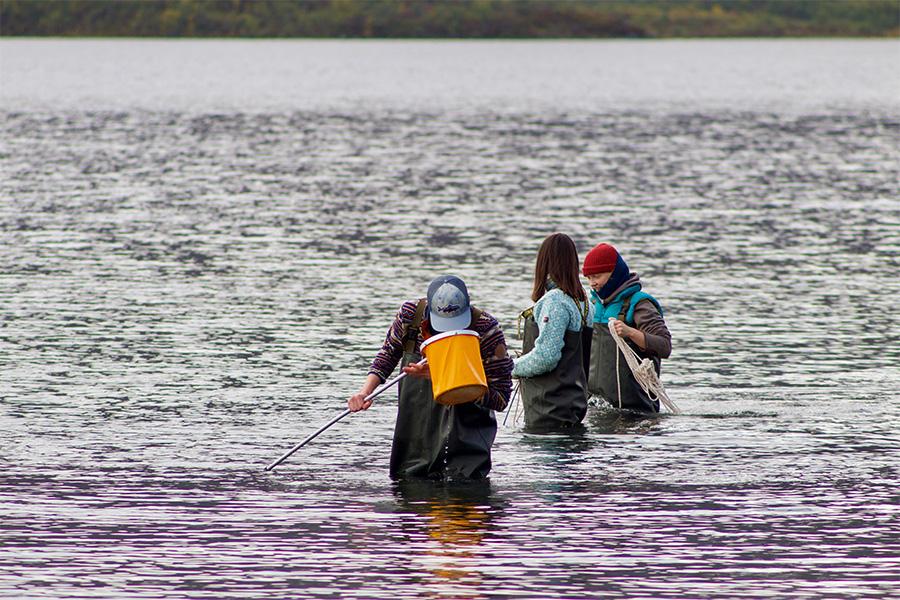In a world perspective, Norway is unique with its immense number of lakes and rivers of great economic and recreational values. These abundant freshwater habitats also constitute excellent model systems both for exploring basic ecological research topics as well as for developing good management strategies. With a master’s degree in Freshwater Ecology, you will be ready to take on jobs within nature management, higher education and consultancy, or continue with research within freshwater ecology and related subjects.
This study programme requires compulsory attendance to the introductory meeting.
Admission requires:
- bachelor’s degree (180 ECTS) or an equivalent degree following a programme of study of minimum 3 years.
- a minimum of 80 ECTS in the bachelor's degree must include a specialization in biological topics [i.e., biodiversity (zoology/botany), ecology, cell- and molecular biology, microbiology, physiology (animal/plant), biochemistry and bioinformatics].
- a minimum grade average comparable to a Norwegian C (3,0) in the ECTS scale. The average grade is calcualted from the entire bachelore´s degree.
- proof of English language proficiency. (Applicants with education from non-Nordic countries. You will find more information of English language requirements here.)
Applicants with a degree in Agricultural, Fisheries and Aquaculture studies, Biomedical laboratory sciences ("Bioingeniør"), or Bachelor of Pharmacy, Medicine or Dentistry do not fulfil the admission requirements.
How to apply for admission to UiT? Read more here
Non-EU students must be prepared to pay tuition fees, more information here
Non-EU/EEA applicants: 2077
EU/EEA + Swiss applicants: 7111
Nordic applicants: 6021
Program description
The freshwater ecology specialization focuses on research in lakes, rivers, and coastal areas, studying fish (especially salmonids), invertebrates, and parasites. MSc projects explore both fundamental ecology and applied topics like nature and resource management. Key themes include population and community ecology, predation, competition, parasitism, food webs, invasive species, migration, life history, catchments to coasts, and the impacts of climate change.
Students will be an integral part of the Freshwater Ecology Research Group and are expected to participate actively.
Learning outcomes
The specialization in Freshwater ecology gives you advanced knowledge in ecological and evolutionary theory, management-related knowledge and key methodologies for research in freshwater habitats and fish ecology. You will gain an overview of the physical and chemical processes in freshwater environments, providing a foundation for understanding the significant seasonal changes in ecological patterns. Additionally, you will be able to critically evaluating information from a variety of sources and to transpose acquired knowledge and competency to issues relevant for society, such as freshwater and fish resource management and conservation.
Job prospectives
The Master’s degree in Biology will allow you to qualify for different career paths and prepare you to step into a professional role or to apply for a PhD.
A Master of Science degree in Biology will prepare you for a wide range of jobs, in both public and private sectors, including research, resource and nature management, administration, consulting and the teaching profession.
The master thesis can play an important role to establish your domain of expertise and to showcase acquired technical and soft skills. Also, it can be very important in building scientific and professional network, that will be a support in your future job search.
Degree Name
Masters of Science in BiologyAccess to further studies
On successful completion of the degree programme, students may be qualified for admission to to a PhD-programme in Biology at the UiT or elsewhere.
Studieplan
Language of instruction
The language of instruction and all syllabus material is English.
Teaching and assessment
Several teaching and assessment methods are employed, including lectures, seminars, laboratory work, computer lab and field courses. These will vary from course to course.
Course examinations may be oral or written examinations, assessments of project work/ lab reports/field reports, often in combination.
Supervision of the project work that leads to the writing of the Master`s thesis will be given by faculty staff, sometimes in co-operation with an external supervisor.
Students can undertake periods of studying at The University Centre at Svalbard (UNIS).
International exchange during an entire semester is not possible in the first year of studies due to obligatory courses.
Stays abroad can take place as part of a master project in the third and fourth semester. Please consult the program study advisor for more information.
Studiesteder du kan utveksle til
Saga Svavarsdottir
SeniorrådgiverVil du vite hvordan det er å være student ved UiT? Følg @uitstudent på Instagram eller TikTok, hvor studenter deler fra livet på universitetet. Her får du praktiske tips om studier og studentliv, nyttig informasjon om campus og muligheten til å stille spørsmål om alt du lurer på.
For mer informasjon om studietilbud, forskning og muligheter direkte fra UiT, kan du følge @uitnorgesarktiske på Instagram eller TikTok. Her finner du offisielle oppdateringer og innsikt i hva universitetet har å tilby.



